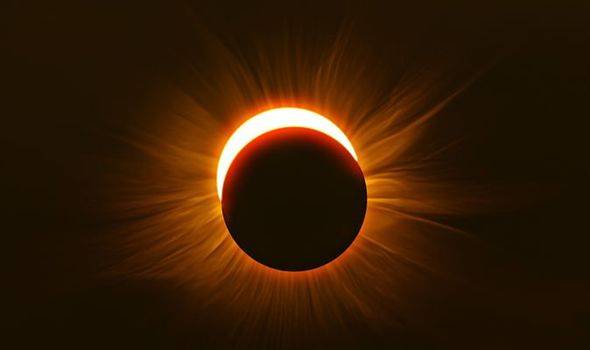
A solar eclipse will be visible in some cities of Pakistan tomorrow (Sunday), according to the Pakistan Meteorological Department's (PMD) Climate Data Processing Centre.
They announced in a statement that "an annular solar eclipse happens when the Moon covers the Sun's center, leaving the Sun's visible outer edges to form a 'ring of fire' or annulus around the Moon."
The timings of the partial eclipse begin at 08:46 PST [8:46 am] and the partial eclipse ends at 14:34 PST [2:34 pm] with the greatest eclipse occurring at 11:40 PST [11:40 am].
People based in Islamabad, Lahore, Karachi, Peshawar, Quetta, Gilgit, Muzaffarabad, Sukkur, and Gwadar will be able to experience the eclipse at various partial levels, with only those in Sukkur being able to witness its entirety at Sun's coverage of 98.78%.
Information provided in the statement indicated that people living in Islamabad, Lahore, Karachi, Peshawar, Quetta, Gilgit, Muzaffarabad, Sukkur, and Gwadar could witness the eclipse at various partial levels, with only those in Sukkur to see the annular eclipse in almost its entirety — at the Sun's coverage of 98.78%.
The Climate Data Processing Centre also said that people in Gilgit will be experiencing the least amount of Sun's coverage in the eclipse, at 74.88%.
The solar eclipse will also be sighted in parts of Africa covering the Central African Republic, Democratic Republic of the Congo (DRC), and Ethiopia, and additionally in India and China, said the PMD.
They announced in a statement that "an annular solar eclipse happens when the Moon covers the Sun's center, leaving the Sun's visible outer edges to form a 'ring of fire' or annulus around the Moon."
The timings of the partial eclipse begin at 08:46 PST [8:46 am] and the partial eclipse ends at 14:34 PST [2:34 pm] with the greatest eclipse occurring at 11:40 PST [11:40 am].
People based in Islamabad, Lahore, Karachi, Peshawar, Quetta, Gilgit, Muzaffarabad, Sukkur, and Gwadar will be able to experience the eclipse at various partial levels, with only those in Sukkur being able to witness its entirety at Sun's coverage of 98.78%.
Information provided in the statement indicated that people living in Islamabad, Lahore, Karachi, Peshawar, Quetta, Gilgit, Muzaffarabad, Sukkur, and Gwadar could witness the eclipse at various partial levels, with only those in Sukkur to see the annular eclipse in almost its entirety — at the Sun's coverage of 98.78%.
The Climate Data Processing Centre also said that people in Gilgit will be experiencing the least amount of Sun's coverage in the eclipse, at 74.88%.
The solar eclipse will also be sighted in parts of Africa covering the Central African Republic, Democratic Republic of the Congo (DRC), and Ethiopia, and additionally in India and China, said the PMD.
